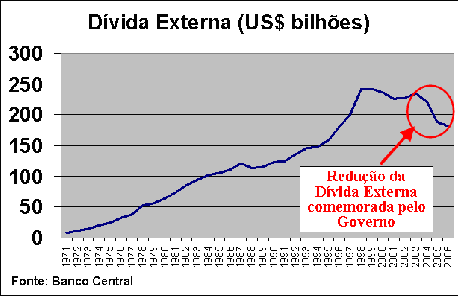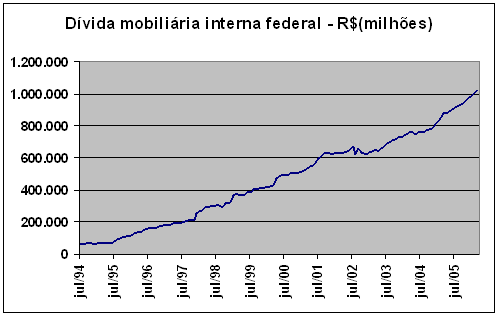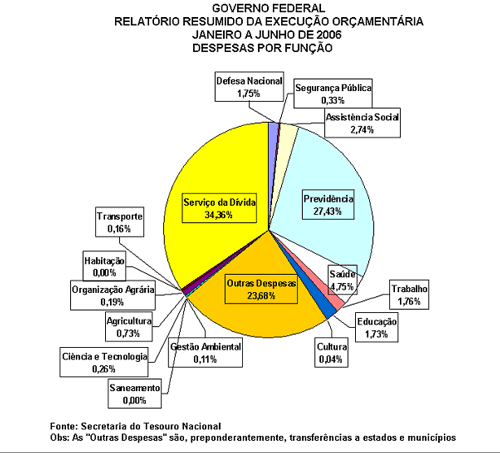Introduction
For
how many decades have millions of Brazilians suffered from
the absence of basic social rights, justified by the notion
that there are insufficient tax revenues to care for them?
How many people died from lack of medical assistance?
How many youth condemned to a future devoid of hope
because they did not have access to education or to a job?
On
the other hand, there was no lack of tax revenue for the
payment of the financial debt – internal and external.
This is not postponed, like the social debt, for the
financial markets cannot overlook anything. The government’s
generosity has been extreme for the financial debt: we pay
the highest interest rates in the world on the internal debt,
and make advanced payments on the foreign debt.
In
this article, we demonstrate how the management of the
public debt hurts human rights. We will unmask the false
propaganda that “the Brazilian economy is doing well.”
In truth, the debt continues to present explosive growth –
even with advanced payments – further prejudicing the poor,
through the model of tributary injustice, by the reduction
of social expenditures and owing to the practice of very
high interest rates, which foment unemployment, low salaries
and violates basic social rights.
Advanced
Payments of the Foreign Debt and the Growth of the Internal
Debt
Toward
the end of 2005, the government began anticipatory payments
on some parts of the foreign debt. In December of 2005, it
paid $15.5 billion to the International Monetary Fund (IMF). In the beginning of 2006, it
also eliminated the debt with the Club of Paris (association
of creditor governments), paying $1.8 billion; and paid
another $6.64 billion in reserves to redeem Brady bonds.
Recently, the government announced that it would
continue redeeming more bonds to pay down the foreign debt,
activating those that should total $20 billion in 2006.
The
government thinks that these advanced payments will reduce
our foreign vulnerability. However, the reality is far from
this propaganda. In
the first place, these advanced payments constitute a small
part of the foreign debt. At the same time in which these
advancements were made, the government accelerated the
emission of new bonds of the foreign debt, with higher
interest rates than the debts paid off in anticipation,
having released, only in the year 2005, close to $14 billion,
when the amount owed for the year was $6 billion[1].
When the rates determined by the IMF were 4% on the year,
and the Brady titles 5.7%, the rates of the bonds released
since January of 2005 averaged rates of 8.5%.
Or as it were, they paid in advanced the cheaper
debts and took on new more expensive debts.

Aggravating
the situation, all the new bonds of the foreign debt
released since 2003 brought a “Clause of Collective Action”
(CAC). This
clause transferred to the Court of New York the resolution
of any controversies over the debt, which violates our
national sovereignty. The
CAC also permits the major creditors (who own 85% of the
debt) to impose their will on an eventual renegotiation of
the debt, which concentrates power with creditors and also
limits national sovereignty.
These
advanced payments also represent an exchange of the foreign
debt for “internal debt”, which has the highest short
term interest rates in the world.
This exchange of foreign debt for domestic debt takes
the following form: to gather the dollars to pay the foreign
debt in advance, the Central Bank (BC) has purchased dollars
from the market. Therefore, when the BC buys dollars, it
injects reais (Brazilian currency) into the economy,
which, in the vision of the government, causes inflation.
This way, to restrict this excess of reais in
the economy, the government releases bonds on the
“internal debt”, in equal value. From October of 2005
until July 2006, the Central Bank purchased $30 billion US
dollars, which resulted in the release of nearly $66 billion
in Brazilian reais of bonds for the internal debt (considering
the exchange rate of R$2.2 per dollar). It is not toeing the line to say that the internal debt
presents explosive growth: already surpassing the mark of
R$1.1 trillion, having grown at least R$107 billion in the
first seven months of 2006.
These
$66 billion reais spent on the acquisition of dollars
by the Central Bank in this short period, and used to
recycle part of the foreign debt into domestic debt, could
have been used to double the sum of expenses on health,
education, land reform, public security, urbanization,
housing, sanitation, culture, science, technology and energy
in 2005.
Another
onerous mechanism that the government has used to advertise
a supposed reduction in the country’s vulnerability to
foreign economic influence is the so-called “operation of
reverse swap”,
performed by the Central Bank.
The name of the operation is complicated, but its
principle is very simple. With these operations, the
government changes foreign debt indexed to the dollar for
internal debt indexed to Selic, with the highest interest
rate for reais in the world. Such operations
represent a paradise for foreign investors, which include
exemption from taxes in order to buy bonds on the Brazilian
domestic debt. Therefore, if the dollar falls, they earn
from the change of the dollar value, without the interest.
The
costs of these swap operations, which actually total more than R$ 30 billion,
allied to a policy of high interest rates, are the principle
factor responsible for the largest loss of funding
registered by the Central Bank in the last years: R$10.45
billion in 2005, and R$12.5 billion in the first half of
2006.
All these losses to the public budget should be
audited, since there is evidence of the transfer of public
funds to the financial sector. In the same periods in which
the Central Bank registered such losses, the commercial
banks had the highest profits of all time: R$ 33.8 billion
in 2005, and R$22.2 billion in the first half of 2006.

Fonte:
Banco Central
When
the financial debt is highly remunerated and paid in advance,
the social debt is postponed
Figures
of the newly released PNAD – National Research for
Domestic Trends – demonstrate the immense social
inequality of the country, with alarming numbers: the
earnings of the average worker, in decline since 1996, had
swift improvement in 2005, attaining R$ 805 monthly, but
still is 15.1% less than that of 1996. The rate of
illiteracy reached 10.9% among people older than 15; 18% of
adolescents between 15 and 17 years old were out of school
in 2005, which means that 1.9 million teens were not in
school last year. Child labor is a reality in the life of
11.8% of children and youth between 5 and 17 years old;
29.6% of the residences in the country do not have sewage
systems, and 86.1% of the families do not have Internet
access. The
PNAD still indicates the rate of unemployment is near 10%,
even though other sources have suggested a rate of 18.01% in
2005.
Other
numbers show human rights violations in the country: housing
deficits of more than 6 million residences, 4 million
families of landless farm workers, and a growth in the
number of urban slums.
Hunger is a reality which affects more than 56
million Brazilians, who survive with earnings as low as R$
79 per month!
The
main social program implemented by the government is the
“Family Scholarship” Program.
This program distributed R$64 monthly for 11 million
participating families. But the causes of poverty, such as
unemployment, the low minimum wage, and the deficiency of
public services, like healthcare and education, are not
addressed by the program. Remarkable social injustice has
provoked an increase in criminality and violence.
Drug trafficking has emerged as a form of subsistence
for many families, provoking a sad change in social
relations.
The
difficult situation of the majority of Brazilian people is
explained through the figures of the public budget. From
2003 to 2005, the federal government exclusively applied to
the interest of the debt (without considering the values
paid for paid-off bonds) R$230 billion, which is equivalent
to 2.4 times the expenditure on healthcare in the same
period, or more than five times the expenditure on education,
or more than 30 times the expense on land reform over three
years.
In
the period between January and July of 2006, the federal,
state and municipal governments generated a primary profit
equivalent to R$62.8 billion or 5.39% of GDP (Gross Domestic
Product, or as it were, all wealth that the country produced
during these seven months). This amount was not sufficient
to pay the interest on the debt, which accounted for 8.16%
of GDP in the period. This means that from each R$100 of all
earnings produced by the country in these seven months,
R$8.16 was needed to pay the interest on the debt.
In analyzing the execution of the federal budget during the
first half of 2006, we can see the distribution of revenue
(R$347 billion). The disbursements to service the debt (interest
plus amortization, excluding refinancing) consumed 34.36% of
the earnings of the period, and were much greater than
expenditures on fundamental social needs, like healthcare,
education and social assistance.
Even with this, it almost voids the value assigned to
important sectors like agriculture organization (with less
than 0.19% of expenditures), transportation (0.16%), science
and technology (0.26%), and housing and sanitation (0.00%).

Auditing
the debt
The
alternative we propose to resolve this problem is a profound
investigation of this process of debt accumulation, which,
despite changing appearance, continues to be the largest
obstacle to development in the country. The debt consumes
the majority of resources that should be destined towards
guaranteeing a dignified life for all Brazilians.
An
audit of the External Debt is permitted within the Federal
Constitution of 1988, in article 26 of the Act of the
Transitional Constitutional Dispositions, though up to today
it has never been done. As this official audit has not
occurred, a “Citizens’ Audit of the Debt” is being
carried out within the Jubilee South movement since April
2001. The objective of this movement is to analyze the
process of Brazil’s debt accumulation, to reveal the true
nature of the debt, and to give more visibility to this
issue, both nationally and internationally.
This Citizen’s Audit will develop actions to
pressure for an official audit.
Beyond
the rescue of documents relative to the historical
experiences of 1931 (audit performed by the government of
Getúlio Vargas), 1987 and 1989 (Commissions formed by the
National Congress), various projects have been carried out
by the movement, which are available at the site www.divida-auditoriacidada.org.br.
We
calculated the impact of unilateral increase in interest
rates by the United States, beginning in 1979, which
provoked the financial crisis of the 1980s, the results of
which represented the principal cause of growth of the
external debt in Brazil.
In 1978, the external debt was US$ 58 billion.
Up to 2005, we paid US$ 241.7 billion, more than that
which we received in loans, and, even so, the debt
multiplied, leaving us still with US$170 billion to pay. If
the interest rates had been maintained at 6% per year since
1978, including the interest and amortizations paid since
then – new loans already discounted – we would have paid
off the entire debt by 1989. Counting the transfers sent
abroad since then, this would have currently made us into
creditors of US$ 211.8 billion.
Researching
the external debt, we demanded access from the Federal
Senate to the contracts related to such operations, on the
basis of the disposition of article 52, line V, of the
Federal Constitution. Barely 238 debt contracts were located
in the archives of the Federal Senate, corresponding to the
815 resolutions that had been informed previously,
suggesting the fact that the contracts are not always
available for the analysis of the senators, who need to
approve these operations.
The contracts we found represent
US$ 42.7 billion, or barely 20% of the debt between 1964 and
2006.
None
of the debt contracts signed by the federal government
during the military period had the approval from the Senate—the
body which is responsible for the approval of all external
loans. According
to the few contracts available in the Senate, fluctuating
interest rate occurred in more than 92% of the financed
value; clauses of renunciation of sovereignty, and
definition of a forum abroad for resolution of litigation,
occurred in 49% of the contracts; and 38% of the resources
obtained obliged Brazil to adopt macroeconomic policies
dictated by the International Monetary Fund or the World
Bank.
The
high and fluctuating interest rates of the “internal debt”
also must be questioned. In the financial crises of the 90s,
this rate, in a matter of days, was fixed at more than 40%
per year, and remains the highest in the world, almost
double that of the next country in the “ranking”. This
characterizes an illegal management of public resources.
In
addition,
diverse operations of the World Bank should be audited, such
as the “reverse swaps”, and the anticipated purchases of
deeds, for being a scandalous privilege to investors.
The relations between members of COPOM (a
governmental body that determines official interest rates)
and the Financial Market should also be investigated.
The
audit of the current debt stock is necessary to prevent the
explosion of the debt. Without an audit, the current debt stock – a product of
innumerous irregularities – would continue to grow.
In
the end, the audit is an important political tool that
should be deepened, as it could consolidate the fight
against the economic domination exercised by the debt. It
gives support to our arguments, by showing evidence of
illegitimacy and illegalities in the process of debt
accumulation suffered by not only Brazil, but also the
majority of the countries in the Southern Hemisphere.
The
audit is a flag that can be raised by many countries.
The search for information and data will promote the
strengthening of the fight against the Debt across the world,
representing an important step towards showing that it was
not a simple coincidence that our countries have applied
similar economic policies.
[1]
The number of 18.01% unemployment was obtained together
with DIEESE. Elaboration
based on the average unemployment rate of 6 Metropolitan
Regions (São Paulo, Distrito Federal, Porto Alegre,
Salvador, Recife and Belo Horizonte), pondered by the
PEA for each metropolitan region.
The DIEESE measures unemployment through
methodology more adequate to Brazilian reality, as it
includes hidden unemployment such as informal work or
discouraged work.